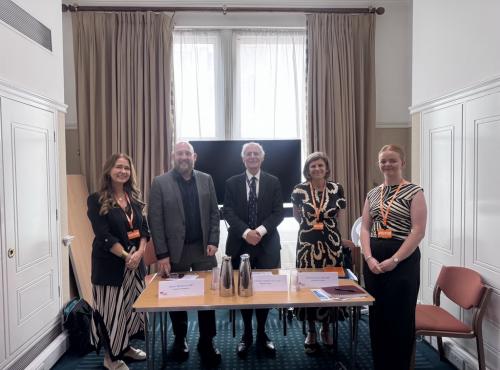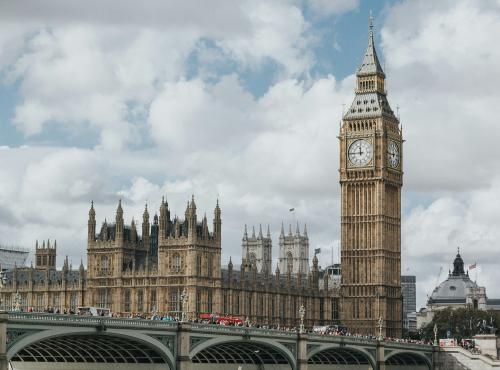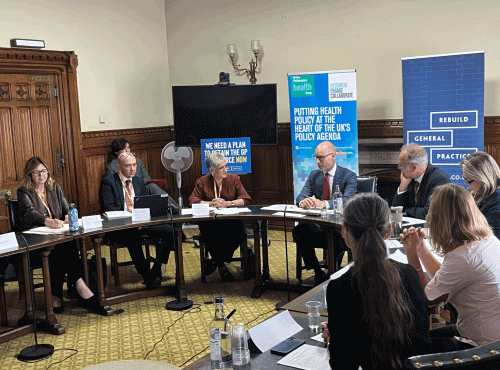Design and Craft for Export
The All-Party Design and Innovation Group (APDIG) and the Crafts Council held an exclusive panel discussion on Tuesday 14th May 2019. The event brought together a range of senior figures from across the craft and wider creative industries design sector to discuss the challenges facing industries, as well as how policy makers can help them grow export opportunities.
The event was hosted by Jack Brereton, Member of Parliament for Stoke-on-Trent South and a key voice in Parliament for craft, especially the world-renowned Staffordshire ceramics industry.
After brief opening remarks from Mr Brereton, the audience heard from Rosy Greenlees OBE, Executive Director of the Crafts Council – the UK’s national organisation for promoting and growing the craft sector. Rosy opened her contribution by up by noting the positive growth and health of the craft export market in the United Kingdom, whilst adding an element of caution regarding the multi-faceted and complex nature of the industry. She then highlights the efforts that the Crafts Council does to promote inward investment and develop UK craft abroad, such as the annual Collect exhibition and the newly launched International Export Toolkit – an industry-led resources for craft business that the Council has developed with the Department for International Trade. Rosy concluded with a call for the Treasury to reform the existing R&D Tax Credit system to ensure that it incorporates relief for businesses trying to accommodate training and shipping costs.
The second speaker was Matthew Young, Senior Policy Officer at the Design Council. Matthew spoke about the wider nature of design exports as part of the British economy, as well as the role that the Design Council is taking to help the sector grow. He noted that design currently accounts for 7 percent of total UK exports, and has continued to grow even as overall exporting declined during the 2009-2015 period. As recently noted by Chief Executive, Sarah Weir, the Design Council are keen to promote design as an integral and multidisciplinary element of the wider economy, and one that is vital to research and development. This was noted in 2018's report on The Design Economy. Additionally, design has a major role to play in meeting the challenges associated with the rise of automation and big data as part of the so-called Fourth Industrial Revolution. A copy of Matthew's presentation is available for download.
The audience then heard from three leading industry figures in the crafts sector about the specific issues and challenges affecting their businesses.
Lulu Lytle is the co-founder of Soane Britain, renowned designer and maker of furniture, upholstery, lighting, fabrics, wallpapers and interior necessities. Every piece is made in Britain using a network of workshops that excel in traditional crafts such as iron forging, chair-making, precision engineering, saddlery and gilding. More than 60 percent of Soane’s orders are sent to North America, where they are seen in private homes, hotels and restaurants. In recent years, Lulu has played a key role in rebuilding the rattan industry in the UK – having helped to save the last weaving workshop in Britain. Once on the brink of receivership, the business is now a thriving enterprise, employing 16 makers including three apprentices. Lulu noted the following key challenges with regard to building exports:
- Simplification of the administrative burden of running a small business would make a big difference. After a low cost honeymoon period it is easy to neglect investment in people and equipment, with employment of staff a frequent barrier.
- Shipping costs are the biggest barrier to exporting.
- Copyright issues impact on the business every week. Soane invests a lot of money in addressing copyright issues in the UK and Europe, but the cost of this is three times higher in the US and so they have to rely on unregistered design rights, often challenging imitators directly but with limited success.
- National Insurance relief for trainees is needed for a longer period seven years. Current relief is only available for a younger age bracket when many employees are in second careers and not eligible.
- The Enterprise Investment Scheme is invaluable but is time limited for the first seven years. R&D tax credits would there be welcome. Currently Soane is employing KPMG to explore whether they can qualify for more, but many small businesses do not have the staff capacity to do this.
- There need to be more opportunities to encourage cross-fertilisation of skills, for example Soane uses a surgery precision tools manufacturer to make its tools.
- Soane are exploring contracting with prisons to train offenders in furniture making through the RSA New Futures Network.
Bill Amberg Studio has existed for over 30 years, and stands as an industry leader in bespoke leather products, interiors and furniture. Bringing together artisans from the worlds of saddlery, case-making, bookbinding and other forms of fine leathercraft, the studio has a mission to explore the aesthetic and material possibilities of leather. As a high value company, Bill Amberg relies on exports to achieve targets. Europe is a primary market and new business is growing in the USA. In his contribution to the panel, Massimo Biglia highlighted that:
- The company invests a lot of time in educating architectural firms and designers about products and further support in this would be welcome.
- All materials are imported from Europe - investment in revival of UK tanneries would reduce costs.
- In order to tap into other markets, the company relies on being able to access skills from overseas and to continue to employ Europeans.
- Shipping costs are a big barrier to exporting.
Sebastian Cox is a design studio and workshop, making timeless collections of furniture, lighting and accessories in south east London. They create spaces for brands, design furniture for production and creative installations in the studio. Sebastian Cox work to champion British woodlands, using fallen trees and growing compostable furniture in a biofacture laboratory. The company employs twelve staff including two apprentices. It is an ‘accidental’ exporter, without specific plans to export. The key problems noted by Sebastian are:
- Shipping costs are a major barrier to exports. As a sustainable company action to increase the environmental sustainability of shipping would also be welcome.
- Trainees arrive with limited making skills and have to be trained up as only two UK universities still run furniture courses.
Following a lively and constructive discussion between the panel and audience, the event concluded with a brief recap by Jack Tindale, Manager for Design and Innovation at Policy Connect. The areas raised at the event will be put towards a formal report, which will be shared with the Department for International Trade and leading Ministers in the coming months.



